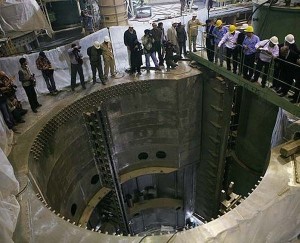 Iran's Middle East rivals have nothing to gain from a nuclear arms race triggered by the Islamic Republic acquiring a nuclear bomb and could be stopped from going nuclear by Western pressure, new research claims.
Iran's Middle East rivals have nothing to gain from a nuclear arms race triggered by the Islamic Republic acquiring a nuclear bomb and could be stopped from going nuclear by Western pressure, new research claims.The assumption that states such as Saudi Arabia, Turkey and Egypt would hastily push to acquire a nuclear deterrent if Iran emerged as an atomic weapons power has underpinned diplomatic efforts to stop Tehran's nuclear programme.
But Looking Beyond a Nuclear Iran,�a new paper from Centre for Science and Security Studies at Kings College London, claims that all three states are in no position to unilaterally acquire nuclear weapons.
As a result warnings that Iran's development of an atomic weapon would destroy the non-proliferation regime that has kept the number of nuclear states in single figures, were overblown.
Christopher Hobbs and Matthew Moran, the authors, point out that Egypt, although it sees itself as a leader of the Sunni Muslim Arab states, has opted for a diplomatic response to the much closer challenge of Israel's undeclared nuclear arsenal. "It would seem very unlikely that the threat presented by a nuclear-armed Iran would cause Cairo to abandon this approach," the report will state.
It adds recent political division and economic difficulties means the weakened Egyptian government that emerged following the fall of President Hosni Mubarak's regime would be ill-placed to acquire a weapon. "While the fall of the Mubarak regime and the subsequent rise of the Muslim Brotherhood has added an air of uncertainty to the future of Egyptian nuclear policy, it has also increased the cost of embarking on the path to nuclear weapons" it said. "Such a decision would likely incur huge economic and security costs."
While Saudi Arabia has deep pockets and no obvious internal political challenge to the monarchy, Riyadh would also refrain from buying its own weapon. The country is too dependent on American arms sales, which would certainly be cut off in response to a nuclear declaration in Riyadh.
"A situation whereby Saudi Arabia would jeopardise its deeply-rooted security relationship with the world's only superpower for dependence on Pakistan is almost inconceivable," the report said.
Turkey has also emerged as a rival to Shia Muslim Iran's gambits for influence in the Middle East despite the two countries strong trade relationship. Its determination to remain in the Western coalition, however, remains its paramount foreign policy goal and would preclude an illicit nuclear programme.
At the same time regional powers have sought to meet growing energy demand by launching nuclear programmes that could act as cover for a dash to "break out" a weapon.
"This has led many to interpret the recent launch of new or renewed nuclear programmes in Egypt, Jordan, the United Arab Emirates and Saudi Arabia as a security hedge against Iran's nuclear progress, " it said.
The authors also add that the general principle that proliferation triggers proliferation even in countries with already advanced civilian nuclear industries. A break out has not taken place in north east Asia, where both South Korea and Japan have remained non-nuclear weapon states despite North Korea's detonation of a nuclear device.
However the authors are much more pessimistic about Iran's interest in atomic weapons. Although there is no evidence Tehran has taken a political decision to produce a bomb, it already possesses the most important element that goes into making a weapon. Its claims that its weapons stockpile is to supply a medical facility in Tehran are no longer credible.
"Iran's growing stockpile of 19.75 per cent enriched uranium, which could be used in a 'break out' scenario to rapidly produce weapons-grade uranium, is already far in excess of what is needed to fuel the Tehran Research Reactor," the authors claim.
By The Telegraph
The Iran Project is not responsible for the content of quoted articles.










